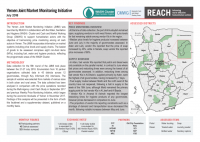Yemen Joint Market Monitoring Initiative (July 2018)
INTRODUCTION
The Yemen Joint Market Monitoring Initiative (JMMI) was launched by REACH in collaboration with the Water, Sanitation and Hygiene (WASH) Cluster and Cash and Market Working Group (CMWG) to support humanitarian actors with the objective of harmonizing price monitoring among all cash actors in Yemen. The JMMI incorporates information on market systems including price levels and supply chains. The basket of goods to be assessed comprises eight non-food items (NFIs), including fuel, water and hygiene products, reflecting the programmatic areas of the WASH Cluster.
METHODOLOGY
Data collection for the fifth round of the JMMI took place between the 21-27 July 2018. Enumerators from 10 partner organisations collected data in 45 districts across 12 governorates, through Key Informant (KI) interviews. The sample of vendors was selected from markets of various sizes in both urban and rural areas. The data collected has been analysed in comparison with the price quotations recorded during the Multi-Agency Joint Cash Study in September 2017 and previous Weekly Price Monitoring Initiative, which began during the economic blockade of Yemen in November 2017.
Findings of this analysis will be presented in the form of both this factsheet and a supplementary dataset, published on a monthly basis.
KEY FINDINGS
PRICE MONITORING OVERVIEW
• At the time of data collection, the port of Al Hudaydah remained open, supplying vendors in north west Yemen, with price levels for fuel remaining stable among vendor KIs in the region.
• Median price levels for hygiene products increased between June and July in the majority of governorates assessed. In Aden and Lahj, vendor KIs reported that the price of soap increased by 43%, while in Sa’ada, soap vendor KIs reported price increases of 88%.
SUPPLY OVERVIEW
• In Aden, fuel vendor KIs reported that petrol and diesel were only available on the parallel market, in contrast to June where fuel prices and restocking times were among the lowest of all governorates assessed. In addition, restocking times among fuel vendor KIs in Al Dhale’e, supplied primarily by Aden, were the highest of all governorates, having increased by 7 days.
• Fuel supply routes between Marib and the north west of the country have not reopened, following a halt in supply in the week of the 18th June, although Marib remained the primary supply point for fuel vendor KIs in Al Jawf and Al Bayda.
• Vendor KIs in Amanat Al Asimah reported the longest restocking times for hygiene products of any governorate, however prices decreased in comparison to June.
• The proportion of vendor KIs reporting constraints such as a shortage of demand and transportation issue decreased this month, following notable increases between May and June.
https://reliefweb.int/report/yemen/yemen-joint-market-monitoring-initiative-july-2018


